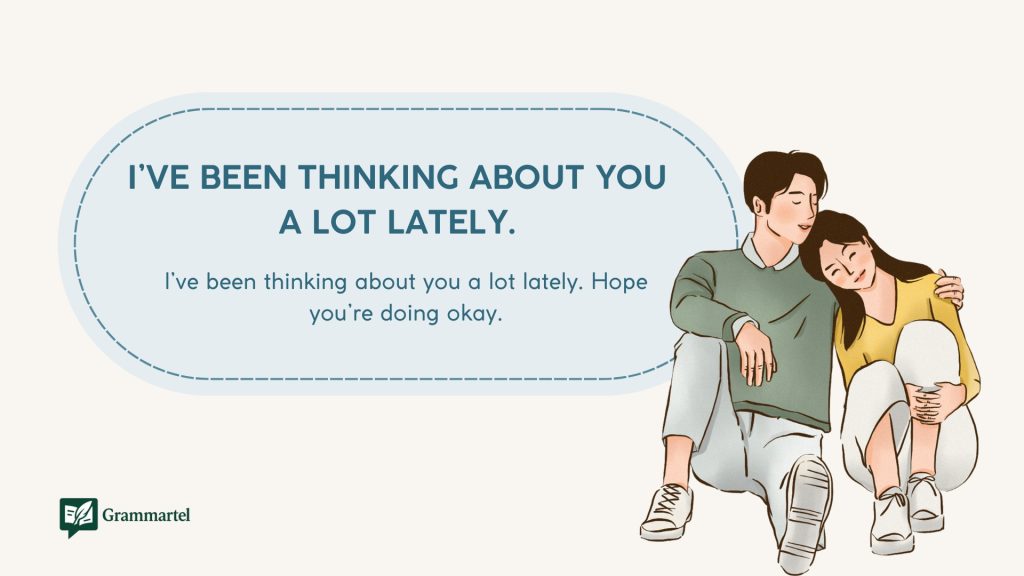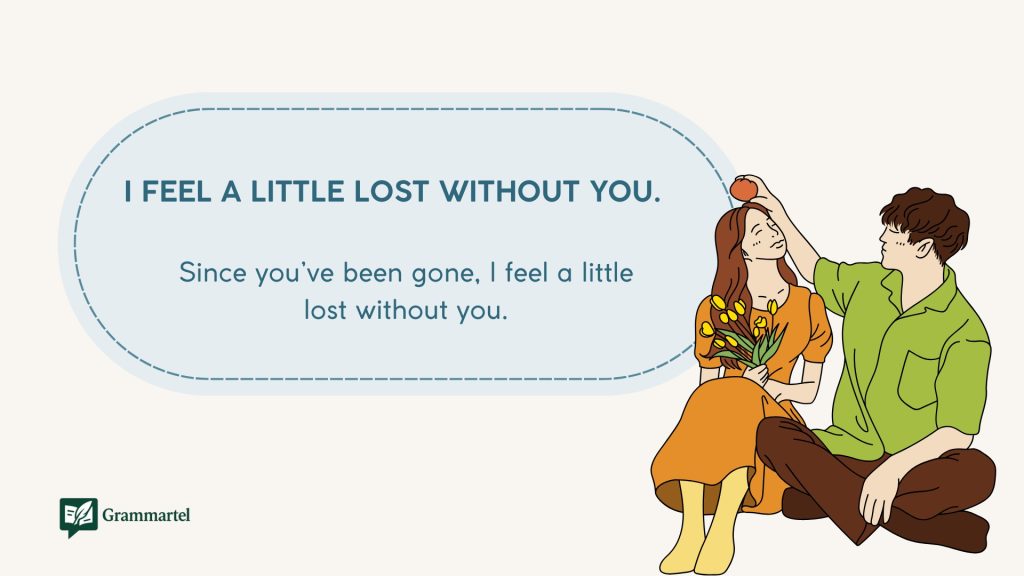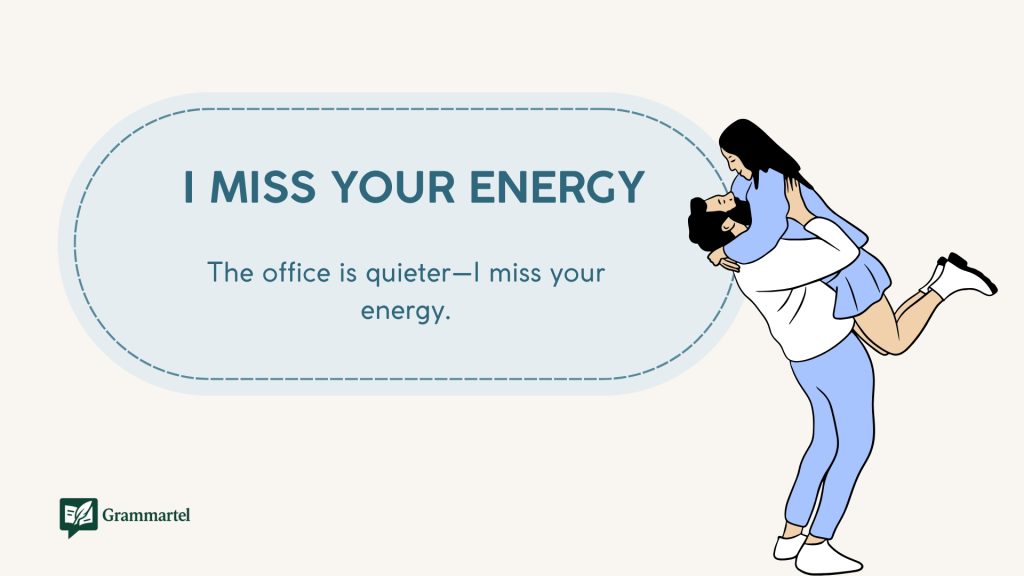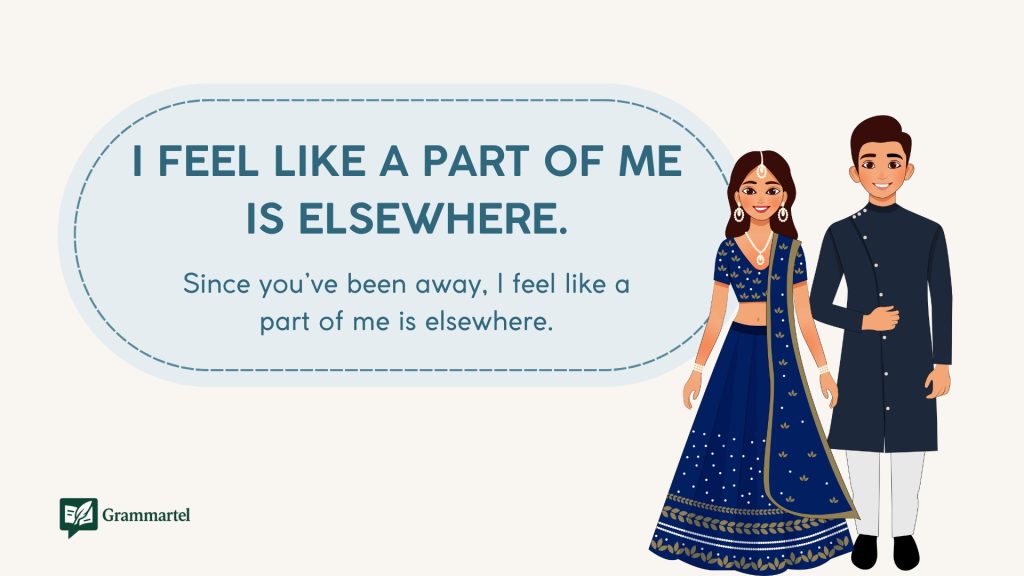Saying “I miss you” can feel a little overused sometimes—especially when your feelings run deeper than just those three words. Whether you’re far from someone you love, missing a close friend, or thinking about someone who’s been gone for a while, sometimes you want to say it in a way that feels more personal, more you. That’s where heartfelt alternatives come in. These little phrases, whether sweet, funny, or sentimental, can say so much more. And when you match the right words with the right moment? It hits differently. Let’s look at 40 ways to say “I miss you” that actually mean something.
What Do “I Miss You” Mean?
“I miss you” means you feel sad or lonely because someone is not with you. It shows that you care about the person and want to be near them. You might say it to a friend, a family member, or someone you love. It’s a short way to say, “I wish you were here.”
When to Use “I Miss You”
You can say “I miss you” when:
- Someone has been gone for a while.
- You feel alone without them.
- You think about them often.
- You want to let them know they are important to you.
It’s a kind and honest thing to say. It helps keep your connection strong, even when you’re apart.
40 Heartfelt Alternatives to Say “I Miss You”
1. I’ve been thinking about you a lot lately.

Meaning: You’re on my mind often.
Explanation: Implies emotional attachment and frequent thoughts about the person.
Example: “I’ve been thinking about you a lot lately. Hope you’re doing okay.”
Best Use: When reaching out after a time apart.
Worst Use: If you’re trying to avoid emotional vulnerability.
Tone: Warm, introspective
2. There’s an emptiness when you’re not around.
Meaning: Your absence is deeply felt.
Explanation: Suggests that the other person brings emotional fulfillment.
Example: “There’s an emptiness when you’re not around—it’s just not the same without you.”
Best Use: In close romantic or emotional relationships.
Worst Use: In professional or casual relationships.
Tone: Deeply emotional, vulnerable
3. Life isn’t as bright without you.
Meaning: Things feel dull or less joyful without you.
Explanation: Highlights the person’s importance to your happiness.
Example: “Life isn’t as bright without you. I can’t wait to see you again.”
Best Use: Romantic or affectionate relationships.
Worst Use: To someone with whom you’re not emotionally close.
Tone: Affectionate, loving
4. I feel your absence every day.
Meaning: Your absence is constantly noticed.
Explanation: Shows consistent longing and emotional connection.
Example: “I feel your absence every day, and it doesn’t get easier.”
Best Use: Long-distance relationships.
Worst Use: In a casual friendship.
Tone: Honest, sentimental
Discover more : 40 Other Ways to Say “Keep Up the Good Work” (With Examples).
5. You left a space that no one else can fill.
Meaning: You’re irreplaceable.
Explanation: Communicates the unique value of the person.
Example: “You left a space that no one else can fill in my life.”
Best Use: In deep emotional relationships.
Worst Use: Too intense for new or casual relationships.
Tone: Intimate, emotional
6. I keep looking for you in places we used to go.
Meaning: You’re missed in shared experiences.
Explanation: Suggests nostalgia and longing.
Example: “I keep looking for you in places we used to go. It’s not the same.”
Best Use: After a breakup or long separation.
Worst Use: If trying to move on.
Tone: Reflective, nostalgic
7. The days feel longer without you.
Meaning: Time drags without your presence.
Explanation: Highlights how important the person is to your daily experience.
Example: “The days feel longer without you here.”
Best Use: Long-distance relationships or during travel.
Worst Use: In short-term separations.
Tone: Sweet, yearning
8. My heart aches for you.
Meaning: I long for your presence.
Explanation: Expresses emotional pain from missing someone.
Example: “My heart aches for you every time we’re apart.”
Best Use: Deep romantic relationships.
Worst Use: May be too intense for casual or platonic relationships.
Tone: Passionate, poetic
9. I keep replaying our memories.
Meaning: I think about our time together often.
Explanation: Shows sentimental attachment to shared moments.
Example: “I keep replaying our memories—they bring me comfort.”
Best Use: When reminiscing during a separation.
Worst Use: If the person prefers to move on.
Tone: Nostalgic, tender
10. It feels like something’s missing—you.
Meaning: I feel incomplete without you.
Explanation: Emphasizes your importance.
Example: “It feels like something’s missing—you.”
Best Use: Romantic relationships or close friendships.
Worst Use: Can seem overly dramatic in early dating.
Tone: Affectionate, emotional
11. I long to be where you are.
Meaning: I wish I could be near you.
Explanation: Expresses desire and emotional closeness.
Example: “No matter where I go, I long to be where you are.”
Best Use: In long-distance or romantic relationships.
Worst Use: Too intimate for acquaintances.
Tone: Romantic, yearning
12. I can’t wait to see you again.
Meaning: I’m excited about our next meeting.
Explanation: Shows anticipation and warmth.
Example: “I can’t wait to see you again—it can’t come soon enough.”
Best Use: For any relationship where affection is mutual.
Worst Use: If there’s uncertainty about seeing the person again.
Tone: Hopeful, affectionate
13. Everything reminds me of you.
Meaning: You’re on my mind constantly.
Explanation: Highlights emotional connection through association.
Example: “Everything reminds me of you—even the smallest things.”
Best Use: In close or romantic relationships.
Worst Use: Can be overwhelming if feelings aren’t mutual.
Tone: Tender, introspective
14. I feel a little lost without you.

Meaning: Your presence grounds me.
Explanation: Suggests you bring emotional or mental balance.
Example: “Since you’ve been gone, I feel a little lost without you.”
Best Use: Romantic or deeply emotional bonds.
Worst Use: With emotionally distant individuals.
Tone: Vulnerable, heartfelt
15. Your absence is louder than words.
Meaning: I can deeply feel your missing presence.
Explanation: Uses metaphor to express longing.
Example: “I didn’t realize how much I’d miss you. Your absence is louder than words.”
Best Use: Thoughtful conversations with close people.
Worst Use: When you need to keep things light.
Tone: Poetic, deep
16. You’ve been on my mind all day.
Meaning: I’ve been thinking of you constantly.
Explanation: Expresses mental and emotional presence.
Example: “You’ve been on my mind all day. I hope you’re well.”
Best Use: To show caring in a soft, friendly way.
Worst Use: If you’re trying to be emotionally distant.
Tone: Casual to warm, depending on context
17. I feel incomplete without you.
Meaning: You make me feel whole.
Explanation: Shows strong emotional dependency or love.
Example: “I feel incomplete without you by my side.”
Best Use: Romantic or soul-deep friendships.
Worst Use: May be too heavy in early relationships.
Tone: Intimate, sincere
18. There’s a you-shaped hole in my heart.
Meaning: I’m emotionally affected by your absence.
Explanation: A metaphor showing emotional loss.
Example: “Since you left, there’s a you-shaped hole in my heart.”
Best Use: Heartfelt messages or letters.
Worst Use: Can feel overly dramatic in casual conversations.
Tone: Poetic, emotional
19. I wish you were here with me.
Meaning: I want your presence.
Explanation: Direct, simple, and emotionally honest.
Example: “This sunset is beautiful, but I wish you were here with me.”
Best Use: When experiencing something you want to share.
Worst Use: If the person can’t or won’t come back.
Tone: Warm, heartfelt
20. Even silence feels different without you.
Meaning: Your presence is comforting—even in quiet moments.
Explanation: Expresses the comfort of simply being together.
Example: “Even silence feels different without you.”
Best Use: For close relationships with deep emotional connections.
Worst Use: To someone with whom silence is awkward.
Tone: Intimate, soft
21. My days are a little dimmer without you.
Meaning: You bring light and joy to my life.
Explanation: Uses imagery to describe how much they’re missed.
Example: “My days are a little dimmer without you here.”
Best Use: Romantic or close friendships.
Worst Use: Can sound overly dramatic in casual exchanges.
Tone: Gentle, poetic
22. You’re the missing piece in my day.
Meaning: My day doesn’t feel complete without you.
Explanation: Suggests you play an essential role in my happiness.
Example: “I got through today, but you were the missing piece.”
Best Use: When someone is away temporarily.
Worst Use: With someone not emotionally close.
Tone: Affectionate, light
23. No one makes me laugh the way you do.
Meaning: I miss your unique energy.
Explanation: Focuses on shared joy and connection.
Example: “No one makes me laugh the way you do—it’s not the same without you.”
Best Use: Friends, partners, or close siblings.
Worst Use: For purely professional relationships.
Tone: Warm, playful
24. You’re always in my heart.
Meaning: I carry you with me emotionally.
Explanation: Timeless expression of love and closeness.
Example: “Even when we’re apart, you’re always in my heart.”
Best Use: To offer comfort during long separations.
Worst Use: For casual acquaintances.
Tone: Loving, reassuring
25. Time apart only makes me value you more.
Meaning: Distance increases my appreciation for you.
Explanation: Highlights gratitude and affection.
Example: “Time apart only makes me value you more—I truly appreciate you.”
Best Use: When reconnecting.
Worst Use: In strained relationships.
Tone: Grateful, reflective
26. I miss your energy.

Meaning: I miss the vibe you bring.
Explanation: Refers to their personality, spirit, or presence.
Example: “The office is quieter—I miss your energy.”
Best Use: Friendly or work settings.
Worst Use: If the person was not particularly close.
Tone: Uplifting, appreciative
27. I miss your voice.
Meaning: I long to hear you speak.
Explanation: Specific and sensory-focused.
Example: “I miss your voice—it always brought me calm.”
Best Use: In romantic or close relationships.
Worst Use: In relationships with unclear boundaries.
Tone: Intimate, soothing
28. I wish I could teleport to you right now.
Meaning: I want to be with you immediately.
Explanation: Lighthearted way to express longing.
Example: “Ugh, I wish I could teleport to you right now.”
Best Use: In playful or romantic conversations.
Worst Use: In serious or professional tone.
Tone: Fun, sweet
29. I miss the way you make everything better.
Meaning: Your presence improves things.
Explanation: Compliments their comforting nature.
Example: “I miss the way you make everything better when you’re around.”
Best Use: Close emotional relationships.
Worst Use: If the dynamic was one-sided.
Tone: Loving, appreciative
30. Nothing feels quite right without you.
Meaning: You’re an essential part of my world.
Explanation: Suggests discomfort or imbalance in their absence.
Example: “Nothing feels quite right without you here.”
Best Use: In relationships with strong emotional ties.
Worst Use: In early or casual connections.
Tone: Sincere, emotional
31. It’s hard not having you here.
Meaning: Your absence is difficult to deal with.
Explanation: Honest expression of emotional struggle.
Example: “It’s hard not having you here—I didn’t realize how much you meant to my day.”
Best Use: In open, supportive relationships.
Worst Use: If the other person is overwhelmed by emotion.
Tone: Candid, emotional
32. Your presence lingers even when you’re gone.
Meaning: I still feel connected to you.
Explanation: Suggests a strong emotional or spiritual bond.
Example: “Your presence lingers even when you’re gone—I feel you everywhere.”
Best Use: In deeply emotional or romantic relationships.
Worst Use: Too intense for professional or casual settings.
Tone: Poetic, spiritual
33. Being apart from you isn’t easy.
Meaning: I struggle with the distance.
Explanation: Simple, straightforward way to share emotional difficulty.
Example: “Being apart from you isn’t easy. I count the days until we meet again.”
Best Use: Long-distance couples or separated family members.
Worst Use: When trying to remain emotionally neutral.
Tone: Honest, heartfelt
Worth a read : 40 Better Ways to Say “Excited to Join the Team” (With Examples).
34. I crave your company.
Meaning: I strongly want to be near you.
Explanation: More intense and emotionally charged than “I miss you.”
Example: “I crave your company, especially on nights like this.”
Best Use: In romantic or emotionally open relationships.
Worst Use: May come off too strong in early dating.
Tone: Passionate, intense
35. I miss the little things you do.
Meaning: I notice and value your unique habits.
Explanation: Focuses on small gestures that made a difference.
Example: “I miss the little things you do—like making coffee just right.”
Best Use: For long-term partners or close friends.
Worst Use: With someone who wasn’t around long enough to form habits.
Tone: Sweet, nostalgic
36. I feel like a part of me is elsewhere.

Meaning: You feel like an extension of me.
Explanation: Suggests strong emotional interconnection.
Example: “Since you’ve been away, I feel like a part of me is elsewhere.”
Best Use: For deep, loving relationships.
Worst Use: Could sound too intense in casual interactions.
Tone: Reflective, emotional
37. The world feels quieter without you.
Meaning: You bring energy and life.
Explanation: Emphasizes the impact of their presence.
Example: “The world feels quieter without you around to fill the space.”
Best Use: When someone is known for their energy or spirit.
Worst Use: With someone who isn’t emotionally close.
Tone: Melancholic, thoughtful
38. You’re the best part of my every day, and I feel that void.
Meaning: You bring daily joy that I now lack.
Explanation: Expresses the weight of absence in everyday life.
Example: “You’re the best part of my every day, and I feel that void deeply.”
Best Use: Romantic partners or soulmates.
Worst Use: In emotionally distant relationships.
Tone: Deeply affectionate, sincere
39. The distance only deepens my feelings for you.
Meaning: Separation has strengthened my emotions.
Explanation: Shows that being apart reinforces love or care.
Example: “The distance only deepens my feelings for you—I never stop thinking of you.”
Best Use: Long-distance relationships or separations.
Worst Use: In situations where feelings aren’t mutual.
Tone: Romantic, reassuring
40. Not a moment goes by that I don’t think of you.
Meaning: You’re always on my mind.
Explanation: Shows persistent and constant affection.
Example: “Not a moment goes by that I don’t think of you and smile.”
Best Use: With someone you share deep emotional connection.
Worst Use: If the person is not emotionally receptive.
Tone: Devoted, sentimental
Conclusion
Missing someone isn’t always about the distance—it’s about the space they leave behind. And the words we use to fill that space? They matter. Whether it’s a quiet “Wish you were here” or a playful “Things aren’t the same without you,” finding the right phrase helps us feel closer, even when we’re apart. So next time you’re thinking of someone, say it like you mean it—your way.
See how Grammartel keeps your writing space simple and focused.

